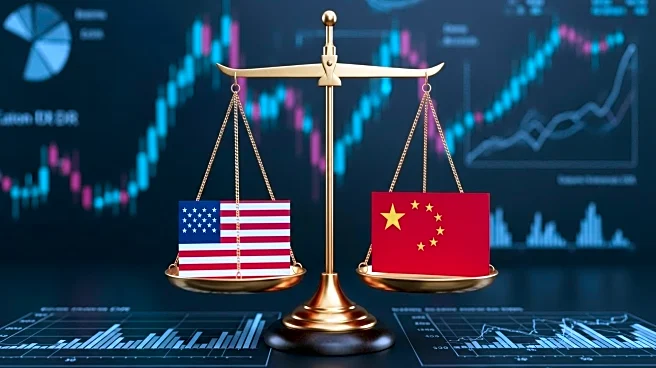What is the story about?
What's Happening?
Wall Street experienced a resurgence of selling pressure on Tuesday following China's escalation of trade tensions with the United States. The Chinese government sanctioned five U.S. subsidiaries of South Korean shipping company Hanwha Ocean, prohibiting them from engaging in business with Chinese entities. This move comes as part of ongoing tit-for-tat trade disputes between the two nations. The renewed tensions overshadowed strong quarterly earnings reports from major U.S. banks, including JPMorgan Chase, Goldman Sachs, Citigroup, and Wells Fargo, all of which exceeded analyst expectations. Pharmaceutical giant Johnson & Johnson also reported better-than-expected earnings. Despite Monday's market rebound, the S&P 500 and Dow Jones Industrial Average faced declines, with the Cboe Volatility Index reaching its highest level since May.
Why It's Important?
The escalation in U.S.-China trade tensions has significant implications for the U.S. economy and financial markets. Increased tariffs and sanctions can disrupt supply chains, affect corporate earnings, and lead to heightened market volatility. Investors are advised to focus on sectors less exposed to trade risks, such as healthcare, while avoiding consumer discretionary stocks vulnerable to higher tariffs. The ongoing trade conflict could impact investor sentiment and economic growth, with potential repercussions for global trade dynamics. Companies with direct exposure to China may face increased risks, affecting their stock performance and strategic planning.
What's Next?
As the trade conflict continues, market participants will closely monitor any further developments or retaliatory measures from both the U.S. and China. Analysts suggest that sectors with direct exposure to the trade escalation, such as semiconductors and quantum computing, may experience increased downside risk. Investors may seek refuge in less volatile sectors, while financial advisors recommend strategies to navigate the uncertain market environment. The situation remains fluid, with potential for further volatility spikes and shifts in market sentiment.
Beyond the Headlines
The ongoing trade tensions between the U.S. and China highlight broader geopolitical challenges and the complexities of international trade relations. The sanctions imposed by China reflect deeper strategic considerations and may influence future diplomatic negotiations. The situation underscores the interconnectedness of global economies and the potential for trade disputes to impact broader economic stability. Long-term implications may include shifts in trade policies, supply chain realignments, and changes in global economic power dynamics.

















